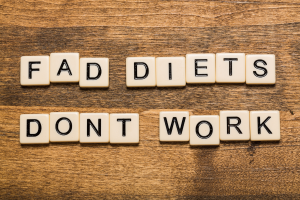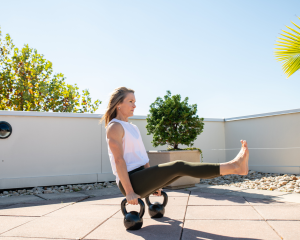In recent years, women have been bombarded with weight loss diet crazes praising food plans emphasizing protein (do keto or paleo sound familiar?), while also criticizing carbohydrates as the enemy of weight loss. As I’ve said before, I eschew fad diets. Not only are these diets not sustainable, they are not healthy in the long run.
Removing or drastically reducing a food group is never a good idea. Our bodies require six essential nutrients to function properly; these include protein, fat, carbohydrates, vitamins, minerals, and water. We must obtain these nutrients through our diets as our bodies are not equipped to produce them on their own. Vilifying carbs and fats in the name of weight loss can lead to nutrient gaps and health trouble (and also excessive stress and worry) down the road.
With the long list of perimenopausal and menopausal symptoms we may experience, nutrient gaps do not need to be one of them. Our diets become even more crucial as we age. And for those of us in perimenopause and menopause, it can make a big difference in keeping our bones healthy and preventing sarcopenia, or loss of muscle mass.

Maintaining bone density and bone flexibility becomes more important as we get older. Yes, we want strong bones, but adding essential nutrients like collagen (found in protein) will also help them stay flexible and more able to resist breaking. This is so important as we become more at risk for osteoporosis during menopause.
As estrogen takes a roller coaster ride, eating foods that focus on replenishing the body with the essential nutrients it needs can now make an ever greater difference in improving sleep, focus, and energy levels. One essential nutrient that has gotten a lot of attention concerning menopause in recent years is protein.
Protein, in a word, provides and balances the micronutrients to optimize our body’s functioning. Just as estrogen affects many areas of the body—from muscles and bones to the heart and the brain—protein aids in muscle building and repair, calcium absorption, maintaining bone mass, keeping blood sugar in check, producing hormones, and maintaining a strong immune system. It is possible that increasing our protein consumption during perimenopause and menopause can help balance the effects of lowering estrogen levels.
Some conditions, like insulin resistance, can be affected by decreasing levels of estrogen during perimenopause and menopause. Estrogen plays a role in keeping our metabolism at a set point. Once estrogen begins to fluctuate unpredictably, it can cause shifts in our blood sugar levels as well. When our bodies struggle to regulate our levels of insulin (a hormone that keeps our blood sugar in check), this can lead to weight gain, insomnia, and lower our ability to handle stress. As if the long list of menopause symptoms wasn’t enough. It’s like a symptomatic double whammy!

A study from the University of Sydney observed a diet higher in protein can lead to better weight management in menopausal women than a standard diet. Much of this stems from protein’s ability to stave off the loss of lean tissue and balance blood sugar. This can be key when estrogen isn’t as effective at regulating insulin. Additionally, maintaining lean muscle mass as we age is super important in keeping us active, energetic, injury-free and mobile, and maintaining bone health.
Another study published by the Journal of Nutrition, Health, and Aging that followed 367 women ages 60-90 noted that the group who consumed more protein had a lower fat-to-lean mass ratio than those on a lower-protein diet. The researchers also noted “significant and meaningful” differences in physical functioning between the two groups of women.
So how do we know how much protein we should be eating during perimenopause and Menopause?
Holistic Nutritionist and producer of the podcast “Fueled and Free,” Margaret Powell, recommends aiming for a higher amount of protein consumption. She notes that the RDA suggestions often start at the baseline one would need to prevent protein deficiency and don’t necessarily reflect the benefits of eating more protein.
In a recent episode, Protein: why it’s so important, how much should you eat, strategies to increase your protein intake, and eating protein for fat loss, Margaret, like many in my industry, recommends eating a protein forward diet, where meals are planned around meeting protein levels first and then adding in carbohydrates and fats after. She says the goal isn’t to eat more calories but to rebalance the micronutrients (the amount of protein, carbs, and fat) to stay within a healthy caloric range. Margaret has her favorite proteins, like Greek yogurt, chicken, fish, and bone broth. She also recommends collagen powder (which she adds to her morning coffee) and is a proponent of quality protein powders to add to smoothies. I’d add to this list my favorite proteins, ground beef or turkey for tacos and the once demonized egg. Love them so much.
Margaret also makes a great point to note the amount of fat and fiber in your diet while increasing your protein intake. Keeping up the fiber content through quality carbs is key to preventing constipation and bloating…not something we need when we’re battling menopause belly!

As I mention in my programs, protein helps keep cravings at bay. I don’t recommend snacking between meals, and if our meals are protein forward, we typically won’t feel the need to reach for a snack. In those moments when a snack is a must, I suggest reaching for something protein-rich, like cottage cheese or a hard-boiled egg, that is READY to eat. We are all in a hurry. I get it! Often carbs are the easier snacks to grab, but protein-rich snacks are just some easy planning away from being as convenient.
I always promote food as fuel. Food is not the enemy of our waistline. The guilt and shame society has placed on our food choices have no place in how we think of ourselves. How we manage our weight is not as simple as “calories in, calories out.” It becomes more complex as we age and experience changes in our hormone levels. We need to do away with the all-or-nothing thinking.
I’m all about flexibility. The way we process and absorb food is different for each person, but as long as we’re honoring what our bodies need today (and not twenty years ago which is vastly different), we’re making the right choices. Instead of trying to fit into the mold we set for ourselves at 25, we need to focus on what our body needs now…and that can change from day to day.
It means being a conscious participant in our own lives and focusing on our own needs. I know that can be tough to do as a mom, a wife, a daughter, a boss, a coworker, and a friend, but pushing through each day without giving yourself what you need is a one-way ticket to exhaustion (trust me, I know).
It is so important to give our bodies the food it needs to thrive. Aim for three nutrient-dense meals a day eaten without distraction. If you’re just beginning a new food journey, start with one meal and add another each week or two. Work on planning protein forward meals to keep your midlife body properly fueled.
And most importantly…stop the guilt!
No one is perfect and success is not linear (I’ve learned that many times over). It is about having the grit and resilience to keep going when things become difficult. It is not giving up on yourself. Trust me, if we can manage a job, raise children, maintain a household, run a business, care for aging parents, and show up for our community, we can most certainly show up for ourselves. Approaching our food in a new way does take time, but that time is well worth it. YOU are well worth it!
Let’s do this!
If you’re looking for some help managing your experience during perimenopause and menopause, consider my Master Menopause NOW! program or contact me to join our community of women who are crushing their wellness in our Concierge Small Group program. Learn about my Wellness Wheel and proven techniques to help you shine during midlife!



